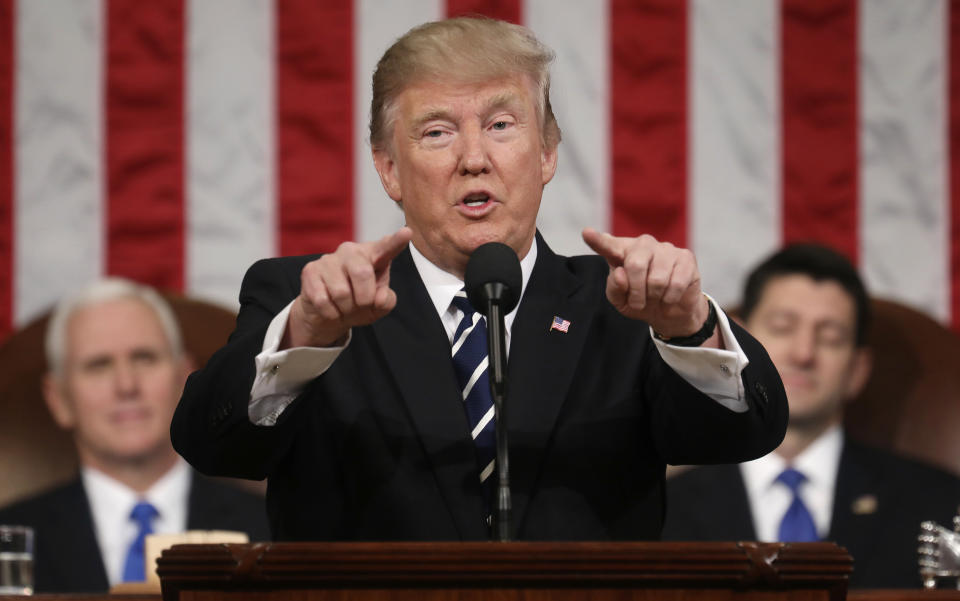Markets are soaring after Trump’s speech, which is no surprise

President Donald Trump continues to be short on specifics, and the stock market continues to love it.
On Tuesday night, President Donald Trump addressed a joint session of Congress, a sort of State of the Union address for a newly-elected president.
The speech was not all that different from Trump’s inauguration address. It was more thematic than it was specific, and when it came to any commentary about the economy, two things stood out: Trump misleadingly stated there are 94 million people out of work, and reiterated calls for a $1 trillion infrastructure package.
Ahead of the speech, conventional Wall Street thinking said markets would “need” or “want” to hear some specifics on Trump’s signature tax reform plan or how the repealing and replacing of Obamacare might actually go down. Neither were offered on Tuesday.
But on Wednesday morning, the Dow was trading above 21,000 for the first time while each of the other US indexes were at fresh records. With a pop of more than 1% in early trading, the S&P 500 is now on pace to break its longest streak of trading days without a 1% move up or down in at least 34 years, according to Bespoke Investment Group.
Not what Trump says, but how Trump says it
Some may attribute the rally on Wednesday to Trump’s tone on Tuesday night, which some political pundits have described as being the first time the President really sounded presidential.
Others might argue that a lack of specifics is, in fact, what markets want to hear from Trump. The other side of this, however, would be that any specifics on economic initiatives offered by the administration are then almost certain to disappoint investors.
Writing in this week’s New Yorker, James Surowiecki notes that conventional wisdom ahead of the election is that Trump’s win would be bad for markets. The exact opposite has been the case.

What’s curious now, however, is that despite being wrong about the overall direction of markets following a Trump win, the same basic analysis that “this all could be setting up for a disappointment” continues to be the conventional wisdom. On Wednesday, for example, strategists across Wall Street noted that Trump’s speech was light on specifics, which markets would like now, but would be a problem in the future.
“What [markets are] not taking seriously is the possibility that Trump may be willing to do things—like start a trade war with China or a real war with Iran—whose outcomes would be truly uncertain,” Surowiecki writes. “Trump won the Presidency by shattering norms and bucking expectations. Markets had better hope that he won’t govern the same way.”
But it’s been clear since Trump’s election is that the investor class is not viewing the Trump presidency the same way the political class is. Markets are certainly betting the norm-shattering, expectation-bucking Trump will continue to prevail, but it is not clear a change would necessarily be received negatively.
The mythical Trump ‘reset’
During Trump’s speech on Tuesday, a number of people were both seriously and sarcastically saying on Twitter that this would serve as a “reset” for the administration. On Wednesday, Politico writes: “Trump hits the reset button.”
The Washington Post‘s Robert Costa, meanwhile, reported Wednesday morning that some White House sources were, “surprised at how pundits are warming to the speech.” Costa added that these sources said the President, “has not changed, no big shift in policy coming.”
In other words, there is no there there.

Writing for Bloomberg on Wednesday, New River Investments’ Conor Sen outlined why the labor market math makes Trump’s only concrete economic pledge from Tuesday night — a $1 trillion infrastructure package — very unlikely to come to pass. Given the Republican Party’s split personality on fiscal restraint, a major spending package is even more daunting politically.
Meanwhile, the President himself earlier this week said that, “Nobody knew that health care could be so complicated.” Repealing and replacing Obamacare, then, is not something to count on. And when it comes to taxes, just look back at last week’s volley of headlines showing the administration crossing itself up at least twice on where it stands on the controversial border-adjustment tax.
Markets have seen this movie before
But I think a tweet from Bloomberg editor Joe Weisenthal on Tuesday succinctly captures the overriding mood on Wall Street right now: assume nothing happens.
“In a way, it’s hard for me to imagine any legislation of any substance ever being passed again,” Weisenthal wrote. “But I’m sure that’s wrong.” And, yes, of course there will be legislation of consequence passed at some point in the future.
But the seeming standoff happening between markets and the administration right now is a little bit akin to the standoff rates traders have been having with the Federal Reserve for years. Rates markets have consistently bet against the Fed raising interest rates with any kind of aggression. Up until now, that impulse has been right. The Fed has raised rates just twice since the financial crisis.
And so right now, stock investors are mostly betting against the Trump administration doing much of anything, good or bad. The financial sector has rallied since Trump’s election, but rolling back or loosening regulations imposed on the sector since the financial crisis is something that can be accomplished by executive order. There is, in other words, no real political process that needs to play out for this trade to be right.
Everything else on the table, then, you can just assume won’t happen. The last six years of the Obama administration were marked by near-total gridlock in Washington. The only things that really happened were prolonged fights about the self-imposed issue of a debt ceiling.
And as the saying goes, “Don’t just do something, sit there.”
—
Myles Udland is a writer at Yahoo Finance. Follow him on Twitter @MylesUdland
Read more from Myles here:
